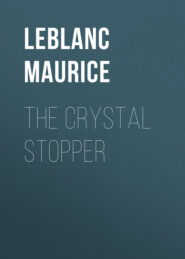По всем вопросам обращайтесь на: info@litportal.ru
(©) 2003-2025.
✖
813
Настройки чтения
Размер шрифта
Высота строк
Поля
"It's he, it cannot be any one else," said Lupin to himself. "It's Malreich. There he is.. breathing.. at four steps from me. There are the hands that kill. There is the brain that gloats upon the smell of blood. There is the monster, the vampire!."
And, yet, was it possible? Lupin had ended by looking upon Malreich as so fantastic a being that he was disconcerted at seeing him in the flesh, coming, going, moving. He could not explain to himself how the man could eat bread and meat like other men, drink beer like any one else: this man whom he had pictured as a foul beast, feeding on live flesh and sucking the blood of his victims.
"Come away, Doudeville."
"What's the matter with you, governor? You look quite white!"
"I want air. Come out."
Outside, he drew a deep breath, wiped the perspiration from his forehead and muttered:
"That's better. I was stifling." And, mastering himself, he added, "Now we must play our game cautiously and not lose sight of his tracks."
"Hadn't we better separate, governor? Our man saw us together. He will take less notice of us singly."
"Did he see us?" said Lupin, pensively. "He seems to me to see nothing, to hear nothing and to look at nothing. What a bewildering specimen!"
And, in fact, ten minutes later, Leon Massier appeared and walked away, without even looking to see if he was followed. He had lit a cigarette and smoked, with one of his hands behind his back, strolling along like a saunterer enjoying the sunshine and the fresh air and never suspecting that his movements could possibly be watched.
He passed through the toll-gates, skirted the fortifications, went out again through the Porte Champerret and retraced his steps along the Route de la Revolte.
Would he enter the buildings at No. 3? Lupin eagerly hoped that he would, for that would have been a certain proof of his complicity with the Altenheim gang; but the man turned round and made for the Rue Delaizement, which he followed until he passed the Velodrome Buffalo.
On the left, opposite the cycling-track, between the public tennis-court and the booths that line the Rue Delaizement, stood a small detached villa, surrounded by a scanty garden. Leon Massier stopped, took out his keys, opened first the gate of the garden and then the door of the house and disappeared.
Lupin crept forward cautiously. He at once noticed that the block in the Route de la Revolte stretched back as far as the garden-wall. Coming still nearer, he saw that the wall was very high and that a coach-house rested against it at the bottom of the garden. The position of the buildings was such as to give him the certainty that his coach-house stood back to back with the coach-house in the inner yard of No. 3, which served as a lumber-room for the Broker.
Leon Massier, therefore, occupied a house adjoining the place in which the seven members of the Altenheim gang held their meetings. Consequently, Leon Massier was, in point of fact, the supreme leader who commanded that gang; and there was evidently a passage between the two coach-houses through which he communicated with his followers.
"I was right," said Lupin. "Leon Massier and Louis de Malreich are one and the same man. The situation is much simpler than it was."
"There is no doubt about that," said Doudeville, "and everything will be settled in a few days."
"That is to say, I shall have been stabbed in the throat."
"What are you saying, governor? There's an idea!"
"Pooh, who knows? I have always had a presentiment that that monster would bring me ill-luck."
Thenceforth it became a matter of watching Malreich's life in such a way that none of his movements went unobserved. This life was of the oddest, if one could believe the people of the neighborhood whom Doudeville questioned. "The bloke from the villa," as they called him, had been living there for a few months only. He saw and received nobody. He was not known to keep a servant of any kind. And the windows, though they were left wide open, even at night, always remained dark and were never lit with the glow of a lamp or candle.
Moreover, Leon Massier most often went out at the close of day and did not come in again until very late.. at dawn, said people who had come upon him at sunrise.
"And does any one know what he does?" asked Lupin of his companion, when they next met.
"No, he leads an absolutely irregular existence. He sometimes disappears for several days together.. or, rather, he remains indoors. When all is said, nobody knows anything."
"Well, we shall know; and that soon."
He was wrong. After a week of continuous efforts and investigations, he had learnt no more than before about that strange individual. The extraordinary thing that constantly happened was this, that, suddenly, while Lupin was following him, the man, who was ambling with short steps along the streets, without ever turning round or ever stopping, the man would vanish as if by a miracle. True, he sometimes went through houses with two entrances. But, at other times, he seemed to fade away in the midst of the crowd, like a ghost. And Lupin was left behind, petrified, astounded, filled with rage and confusion.
He at once hurried to the Rue Delaizement and stood on guard outside the villa. Minutes followed upon minutes, half-hour upon half-hour. A part of the night slipped away. Then, suddenly, the mysterious man hove in sight. What could he have been doing?
"An express message for you, governor," said Doudeville, at eight o'clock one evening, as he joined him in the Rue Delaizement.
Lupin opened the envelope. Mrs. Kesselbach implored him to come to her aid. It appeared that two men had taken up their stand under her windows, at night, and one of them had said:
"What luck, we've dazzled them completely this time! So it's understood; we shall strike the blow to-night."
Mrs. Kesselbach thereupon went downstairs and discovered that the shutter in the pantry did not fasten, or, at least, that it could be opened from the outside.
"At last," said Lupin, "it's the enemy himself who offers to give battle. That's a good thing! I am tired of marching up and down under Malreich's windows."
"Is he there at this moment?"
"No, he played me one of his tricks again in Paris, just as I was about to play him one of mine. But, first of all, listen to me, Doudeville. Go and collect ten of our men and bring them to the Rue des Vignes. Look here, bring Marco and Jérôme, the messenger. I have given them a holiday since the business at the Palace Hotel: let them come this time. Daddy Charolais and his son ought to be mounting guard by now. Make your arrangements with them, and at half-past eleven, come and join me at the corner of the Rue des Vignes and the Rue Raynouard. From there we will watch the house."
Doudeville went away. Lupin waited for an hour longer, until that quiet thoroughfare, the Rue Delaizement, was quite deserted, and then, seeing that Leon Massier did not return, he made up his mind and went up to the villa.
There was no one in sight… He took a run and jumped on the stone ledge that supported the railings of the garden. A few minutes later, he was inside.
His plan was to force the door of the house and search the rooms in order to find the Emperor's letters which Malreich had stolen from Veldenz. But he thought a visit to the coach-house of more immediate importance.
He was much surprised to see that it was open and, next, to find, by the light of his electric lantern, that it was absolutely empty and that there was no door in the back wall. He hunted about for a long time, but met with no more success. Outside, however, he saw a ladder standing against the coach-house and obviously serving as a means of reaching a sort of loft contrived under the slate roof.
The loft was blocked with old packing-cases, trusses of straw and gardener's frames, or rather it seemed to be blocked, for he very soon discovered a gangway that took him to the wall. Here, he knocked up against a cucumber-frame, which he tried to move. Failing to effect his purpose, he examined the frame more closely and found, first, that it was fixed to the wall and, secondly, that one of the panes was missing. He passed his arm through and encountered space. He cast the bright light of the lantern through the aperture and saw a big shed, a coach-house larger than that of the villa and filled with old iron-work and objects of every kind.
"That's it," said Lupin to himself. "This window has been contrived in the Broker's lumber-room, right up at the top, and from here Louis de Malreich sees, hears and watches his accomplices, without being seen or heard by them. I now understand how it is that they do not know their leader."
Having found out what he wanted, he put out his light and was on the point of leaving, when a door opened opposite him, down below. Some one came in and lit a lamp. He recognized the Broker. He thereupon resolved to stay where he was, since the expedition, after all, could not be done so long as that man was there.
The Broker took two revolvers from his pocket. He tested the triggers and changed the cartridges, whistling a music-hall tune as he did so.
An hour elapsed in this way. Lupin was beginning to grow restless, without, however, making up his mind to go.
More minutes passed, half an hour, an hour..
At last, the man said aloud:
"Come in."
One of the scoundrels slipped into the shed; and, one after the other, a third arrived and a fourth..
"We are all here," said the Broker. "Dieudonne and Chubby will meet us down there. Come, we've no time to lose… Are you armed?"
"To the teeth."
"That's all right. It'll be hot work."











